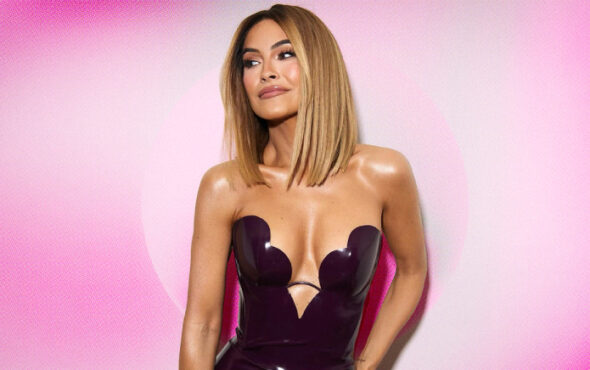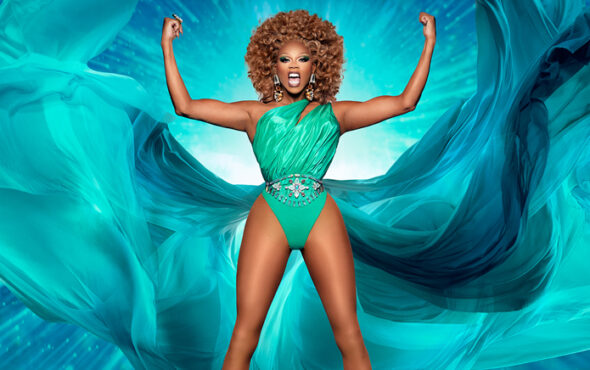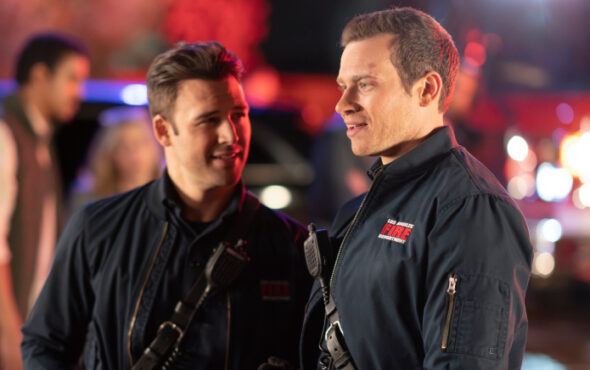
What a year it has been.
For our Queer Year In Review, we’ve rounded up some of the biggest moments, groundbreaking achievements, but also the challenges that LGBTQ people continue to face in their fight to equality.
Overall, 2019 has felt like a year of firsts. Lil Nas X, Disney Pride, and Billy Porter are just a few who have made history, while Drag Race and Pose continue to push authentic queer narratives firmly in the mainstream.
Below we take a look at 15 queer moments from 2019 that are significant in our fight, with a few fun ones thrown in too.
DRAG RACE UK

After years and years of rumours and anticipation, RuPaul’s Drag Race UK finally launched back in October and honey… sickening, it was absolutely mothertucking sickening YES GAWD! The crass sense-of-humour and references to iconic soaps and dramas, as well as the interactions between the contestants, was a breath of fresh air and resulted in peak British television. It wasn’t Americanised, like we feared. The challenges were more of the same, but the way they were executed? Perfection. Downton Draggy? Future BAFTA winner. Snatch Game? Two of the best celebrity impressions in Margaret Thatcher (Baga Chipz) and Donald Trump (The Vivienne). And Frock Destroyers? Watch out Little Mix, you ain’t safe. Over the course of eight weeks, the series was requested a staggering 10 million times on BBC iPlayer. Due to its unprecedented success, it was announced last month by World of Wonder and BBC Three that RuPaul’s Drag Race will sashay, shantay and stay on the BBC for a second season, which is due to air sometime in 2020. “I want to thank the BBC and all our fans for their overwhelming support of RuPaul’s Drag Race UK,” RuPaul said in a statement. This season’s queens proved that Britain’s got charisma, uniqueness, nerve and talent and I want to see more!”
LIL NAS X COMES OUT AND BREAKS RECORDS

Many famous faces came out publicly this year, stepping up to become beacons of queer visibility for the millions that follow them. But arguably the most high-profile was Lil Nas X. The fact that it coincided with the 50th anniversary of the Stonewall Uprising – credited as the birth of the modern queer liberation movement – is poetic. Fifty years on we have a young, black queer musician working across hip-hop and country music being open about who he is at the peak of his success. And when we say success, we mean phenomenal pop culture impact. Old Town Road became the longest-running No.1 on the Hot 100 in the US, Lil Nas X became the first openly gay man to receive nominations at the Country Music Awards, and is currently in the running for numerous Grammy Awards. Yeah, he received some online hate when he came out, but he disarmed the bigots with humour and grace, becoming a new queer role model for a new generation.
SAM SMITH AND JONATHAN VAN NESS COME OUT AS NON-BINARY

And it wasn’t just high-profile celebrities coming out as gay, some also came out as gender non-binary. Among them were singer Sam Smith and Queer Eye’s resident hair and beauty expert, Jonathan Van Ness. As people try and constantly erase the non-binary community, due to their own ignorance and prejudices, it’s refreshing to see such high-profile people saying they’re part of that community. Sam’s coming out as gender non-binary, and subsequent reveal of them identifying with they / them pronouns was noted by Merriam-Webster when the dictionary named they as its word of the year, and expanded its definition of the word to include how gender nonconforming people identify with it as their pronoun. Jonathan has also spoken about the importance of using people’s correct pronouns, slamming those who attempt to misgender people and calling SAM “FEARLESS” for their coming out. Jonathan also shows how diverse the non-binary community is, saying that he is fine with whatever pronoun people refer to him with whether it be he, she or they. As we go into 2020, we know that these two fierce people will continue to promote non-binary representation and help those who identify similarly.
BILLY PORTER MAKES HISTORY WITH HIS EMMY WIN

Following the breakout success of groundbreaking series Pose in 2018, this year saw the stars who bring the show to life soar even higher. Achieving firsts in his own right is leading man Billy Porter. After a stellar second season that aired over the summer months, some high-profile Pride appearances in the US and UK, as well as covering Gay Times Magazine in June, Billy made history in September as the first openly gay Black man to win Lead Actor in a Drama Series at the Emmy Awards for his role of Pray Tell. “We, as artists, are the people that get to change the molecular structure of the hearts and minds of the people who live on this planet. Please don’t ever stop doing that,” Billy said during his acceptance speech. “Please don’t ever stop telling the truth.”
HOMOSEXUALITY DECRIMINALISED IN BOTSWANA

While other countries have doubled down on their anti-LGBTQ views and laws this year – Gabon even made homosexuality illegal – one country showing progress was Botswana. In June, high court judges unanimously ruled that colonial-era laws criminalising same-sex relationships are unconstitutional and should be struck down. “Human dignity is harmed when minority groups are marginalised,” said Justice Michael Leburu as he delivered his judgement. “Sexual orientation is not a fashion statement. It is an important attribute of one’s personality.” It was reported a month later that the Botswanian government would attempt to challenge the decision to decriminalise homosexuality, with Attorney General Abraham Keetshabe saying the judges had made a mistake, but it’s been quiet since then. For now, it’s a win.
STONEWALL 50

Millions of people ascended upon New York City this summer for one of the biggest celebrations of everything LGBTQ has ever seen. The streets of Manhattan were bursting with rainbow flags, joy and unity. 28 June marked the 50th anniversary of the Stonewall Uprising, where patrons of the iconic LGBTQ venue rose up against police brutality in the summer of 1969. Led by a group of trans women of colour, the queer community fought back and haven’t stopped since. It took the modern LGBTQ liberation movement to the next level, and saw the birth of our annual Pride celebrations. This summer’s Pride celebrations were a moment of reflection for the community; to both understand how far we’ve come, but be sure of the big battles we still have. There’s no doubt LGBTQ rights have come on leaps and bounds in the past five decades in Global North, but there’s little doubt that the fight for true equality is still very much a long way off in many parts of the world. As queer people we have a responsibility to fight for our queer siblings everywhere, and World Pride in NYC was a reminder that together as a community we can continue to change the world.
REMEMBER THEIR NAMES

While many of the entries on this list are victories, sadly not all of them are. Levels of violence against transgender people is disproportionately high, and at the time of writing at least 21 trans individuals have been murdered in the United States alone, with 20 of them being trans women of colour. Dana Martin. Jazzaline Ware. Ashanti Carmon. Claire Legato. Muhlaysia Booker. Michelle Washington. Paris Cameron. Chynal Lindsey. Chanel Scurlock. Zoe Spears. Brooklyn Lindsey. Denali Berries Stuckey. Kiki Fantroy. Jordan Cofer. Pebbles LeDime “Dime” Lo. Tracy Single. Bailey Reeves. Bee Love Slater. Ja’leyah-Jamar. Itali Marlowe. Brianna “BB” Hill. Remember their names. These figures get even more alarming when they’re expanded to the rest of the world. This year, on Trans Day of Remembrance, it was said that 331 trans and gender non-conforming people had been murdered worldwide in the past year. Brazil accounted for the highest figure, being 130; on average that means that a trans or gender non-conforming person is being murdered in the country every two and a half days. Going into 2020, this number needs to fall and needs to fall drastically.
NORTHERN IRELAND LEGALISES SAME-SEX MARRIAGE

The DUP has pretty much single-handedly prevented positive LGBTQ rights coming to Northern Ireland, consistently employing a petition of concern mechanism to prevent same-sex marriage. However, votes in the House of Commons earlier this year finally extended the right to marry to Northern Ireland’s same-sex couples – even if the DUP did attempt to reform the Northern Irish Assembly in an attempt to block it. The law came into effect on 22 October, and it is expected that the first same-sex couples in Northern Ireland will be allowed to marry on Valentine’s Day. Michelle O’Neill, the leader of Sinn Féin called it a “hugely significant day” and praised how LGBTQ people could have their marriages recognised by law. Nicola Coughlan, who plays lesbian Clare Devlin in Derry Girls, gave a shoutout to “all the wee lesbians” who “can finally be treated as equal in their own country”. And what about Arlene Foster of the DUP? She called it a “sad day.”
CANDY’S DEATH IN POSE

This season of Pose featured one of the most heartbreaking hours of television ever produced. In the fourth episode of season two, Angelica Ross’ breakout character Candy was found brutally murdered in a motel room. It highlighted the very real problem of trans women of colour being forced into sex work to survive, and in doing so putting their safety at risk of extreme violence and, in this case, murder. Although her death at the hands of cishet man took place in 1990, the killing of trans women – particularly trans women of colour – as we mentioned above, remains an ongoing issue. “The reaction was overwhelming and I think it’s exactly what the world needed, for something to hit close to home,” Angelica told us of the outpouring of grief from viewers for Candy. “For many of our viewers it’s beautiful to see that they got what we meant for them to get, which was this conviction to now be on the lookout, to be like, ‘This has made me aware that this issue is still going on, or there are ways that I can speak up more and use my privilege.’”
LANDON CIDER IS THE FIRST DRAG KING TO WIN A MAJOR REALITY COMPETITION IN THE US

Earlier this year, HERstory was made when Landon Cider, a drag king, won the third season of The Boulet Brothers’ Dragula. Landon emerged victorious against nine other performers, all of which were drag queens, after ten gruelling weeks in which he devoured live spiders, catapulted out of a helicopter and stapled dollar bills to his body. He became the first drag king to win a reality competition series in the United States. It was monumental for the art-form. In a time where RuPaul’s Drag Race is dominating the mainstream, drag kings are often erased from the narrative. With Landon’s win, he has become a beacon of light for others in the field and shown mainstream audiences that drag kings can “reign just as supreme as queens”. Shortly after his historic win, Landon told us: “I can only do me and I can only do me at my best, and hope to inspire people to research our drag kings, whether it’s locally or just on Instagram so they can see all the infinite talent. I cannot fully represent, but I can only hope to inspire you to find them.”
TALES OF THE CITY MAKES A RETURN

One of the most anticipated TV series of the year was Netflix’s revival of Tales Of The City. The LGBTQ-themed TV series, which was based on the collection of nine classic novels by Armistead Maupin, followed Midwest girl Mary Ann Singleton as she moved to San Francisco and discovered a world of drugs, disco and homosexuality. When it debuted in 1993, it was widely regarded as one of the first TV shows to fairly represent LGBTQ characters, as it tackled several important issues like coming out, HIV/AIDS, and gender identity. It’s return this year explored even more prominent talking points affecting the community, and introduced further diverse representation including Garcia’s trans man Jake, Ellen Page’s very woke gay girl Shawna and May Hong’s sexually fluid Margot. It also made efforts to educate viewers on LGBTQ history, including a flashback episode dedicated to the Compton’s Cafeteria riot in 1966. “One of the big things that the new series says is that we’re all in one family, regardless of our ages,” author Armistead told us earlier this year. It’s a theme that ran through the heart of the show.
JESSICA LANGE GIVES US AN ICONIC LINE

Earlier this year, Oscar, Tony and Emmy-winning actress, legend and icon Jessica Lange became a viral sensation on social media for perfectly summing up the gay agenda. In the debut season of Ryan Murphy’s new Netflix series The Politician, Lange – who plays Southern belle Dusty Jackson, a money-grabbing sociopath – informs her granddaughter Infinity (Zoey Deutch): “I don’t understand why calling that gay man a butt-munch was such a scandal. That’s what gays do: munch butts and celebrate Halloween.” Was she wrong? ABSOLUTELY NOT. Facts are facts. In a cruel, cruel twist of fate, Lange failed to receive a Golden Globe nomination for Best Actress. We don’t want to say “homophobia wins again!” but…
DISNEY CELEBRATES ITS FIRST OFFICIAL PRIDE

LGBTQ people have always had an affinity with Disney, and this year the House of Mouse showed the love right back with their first official Pride celebration at Disneyland Paris in June. The much-loved tourist attraction transformed their Walt Disney Studios Park into a celebration of diversity and all things LGBTQ, featuring performances from British band Years & Years – who covered queer anthem Reflection from Mulan’s soundtrack – and French disco star Corinne, as well as DJ sets from SindyKatz and Boy George. Of course, Pride wouldn’t be Pride without a parade, and Disney delivered by featuring hundreds of marchers in rainbow t-shirts alongside iconic characters from Genie to Buzz Lightyear, and Mickey and Minnie even wore matching Pride outfits. We might still be waiting for adequate LGBTQ representation from Disney on the big screen, but hosting a Pride spectacle like this is a very good start.
GARETH THOMAS AND JONATHAN VAN NESS OPEN UP ABOUT LIVING WITH HIV

Despite people with HIV being able to live full and healthy lives thanks to breakthroughs in medicine, discrimination against those who have it sadly still exists. As with any stigmatised topic, it takes people brave enough to speak out and raise awareness, and this year we saw two major names share their status with the world. Non-binary Queer Eye style guru and all-round icon Jonathan Van Ness opened up about life with HIV – as well as his experiences of sexual abuse and addiction – in his new memoir Over The Top, describing himself as a “member of the beautiful HIV positive community”. Meanwhile, former Welsh rugby captain Gareth Thomas revealed he has HIV through social media after a paper threatened to ‘out’ him. “Now that you have that information, it makes me extremely vulnerable, but it does not make me weak,” he said at the time. “I choose to fight to educate and break the stigma.” Both stars come from wildly different backgrounds – and likely have very different followers – so their willingness to be open and use their platform to discuss life with HIV will no doubt change many minds and hearts.
THE DEMISE OF STRAIGHT PRIDE

If ever anyone says to you “why isn’t there a straight Pride?” be sure to send them this way where we’ve outlined nine reasons it doesn’t need to exist. Like, at all. The slogan has been kicking around since the 1980s as a response to our annual Pride celebrations, but this year it had way more of a moment than it deserved. Back in the summer, a group called Super Happy Fun America received a permit to hold their event on August 31 from the City of Boston. According to their website, they hoped the parade and platform would mean that “FINALLY STRAIGHT PEOPLE WILL HAVE THEIR VOICES HEARD”. Cue all the eyerolls ever. But they were spectacularly taken down when the event – which genuinely included an inflatable dinosaur as one of its mascots – faced a counter-protest of pro-LGBTQ activists that massively outnumbered them. Straight allies remain essential in our journey towards equality, acceptance and celebration, but this very loud minority of straight people grossly misunderstand the purpose of Pride.



